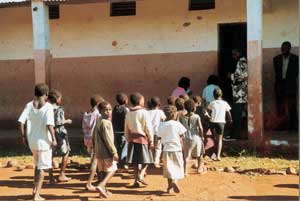Inclusive Schools in Mozambique – From policy to strategy
Elina Lehtomäki
Major changes have taken place in the Mozambican education system following the resolutions of the 2nd World Congress on Education for All (EFA) in Dakar, April 2000. The Mozambican government is preparing its strategy for the establishment of 7 years of basic education for the whole school population by 2015. The Annual Education Sector Review (2001) shows the enormity of the task. In recent years enrolment in primary school (EP1 classes 1-5) has increased significantly, with about 92% of 7 year olds entering school. 67% of these children complete the 5 years of compulsory primary education. For various reasons only 25% of school-leavers continue to the next phase and 53% of these pupils complete 7th class (EP2). Consequently the number of people in Mozambique who have completed basic education is still limited. Here Elina Lehtomäki summarises progress made by drawing upon the experience of her collegues: Aissa Braga, Lucas Chiluvane, Gilda Mahumane and Fransisco Tembe.

The Mozambican national education policy defines basic education as a universal right. In 1998 the Ministry of Education launched the ‘Inclusive Schools’ project, with UNESCO’s support, to combat exclusion and promote schooling for all children.
The strategy is to raise awareness of diversity throughout the education structure. Activities consist of short capacity building courses for provincial co-ordinators and teachers in pilot inclusive schools. “We’re collaborating, for example, with the Institute for Development of Education and the Distance Learning Institute”, says Aissa Braga, the Head of Special Education in the Ministry of Education.
A national evaluation has not yet taken place because of a shortage of resources, but it is expected that the results of the project will be positive. Each province, 10 altogether, and the capital, Maputo, is implementing the EFA policy and the inclusive schools project in its own way.
FAMOD, the Mozambican federation of disabled people’s organisations, estimates that the majority of children who remain outside the school system, and those who repeat or drop out during the early years of primary education are disabled, or have learning difficulties which require special attention.
The provincial education directorate of Maputo designed its strategic plan in 1998. Lucas Chiluvane co-ordinates the inclusive education activities in the province. Here he reviews progress made during the first 3 years:
“Currently teachers and schools are able to identify pupils who have ‘special educational needs’, and what type of needs they have. We have held regular sensitisation and training workshops throughout the existing education system. First the eight district co-ordinators were trained and then we facilitated the organisation of regular district seminars. Then teachers were trained at district level by the school zones – ‘zonas de influencia pedagogica’ or ZIPs. Each ZIP covers 2-10 schools. We can see that the whole education structure has actually been sensitised. We collaborated also with 4 teacher education institutes.”
In 2001 the province of Maputo organised an inclusive education competition in two stages. First, each district asked the teachers to share their experiences of identifying special needs in the classroom, and to report on how they teach pupils who have difficulties in learning, or who have impairments. The teachers who produced the best case reports were awarded bicycles, radios and books on inclusive education. Each teacher education institute also organised a competition for their students and lecturers. Here are some comments from those teachers who took part in the competitions:
“It is clear that we need more training and regular support. It was very important to discuss with colleagues from other schools in our district. There are many children with various difficulties in the classroom and many others who stay at home. But there are also parents of disabled children who want their children to have an education. Teachers are the ‘second parents’ and they need to accept all types of children. We like to discuss these real issues of our daily work. The training was practical and useful.”
The district-level competitions were a learning opportunity also for the members of the juries, composed of district education directors and officers, province education officers and teacher educators. The jury members had to read the reports and listen to the presentations, discuss the strategy and the practice of inclusive schools, and evaluate the training needs on the ground. The second stage, at provincial level, motivated teachers and directors to give information about the activities of inclusive schools to the public, and to further involve the education sector and society.
“It is important to create opportunities at every level of the education structure to exchange information and experience, and to promote good practice on the ground. The most useful stories will be included in a collection. This will provide us with local study material.”
Gilda Mahumane, the Education Director of Maputo province.
“There has been a change in attitude in the education sector following many meetings and negotiations. Still major changes are needed in schools if they are to include all children. Appropriate curriculum adaptations and quality teacher education, for example. Additionally, it is important to involve disabled people and their organisations in teacher education.”Fransisco Tembe, Coordinator of FAMOD, the umbrella organisation of organisations of disabled people.

Elina Lehtomäki has worked for the CBR programme and disabled people’s organisations in Mozambique for the past ten years, with financial support from Finland. Since 1998 she has also been supporting EFA and inclusive schools. The Finnish government provides support for education sector development in Mozambique through school construction, assessment and the development of institutional capacity. The University of Jyväskylä contributes to the education development programme with regular short-term technical assistance.
Elina can be contacted at: University of Jyväskylä, Department of Special Education
elinaleh@edu.jyu.fi
www.cc.jyu.fi/~elinaleh/Maputoprovinve2001/index.html
Her colleagues can be contacted as follows:
Aissa Braga: aissa.braga@mined.uem.mz
Lucas Chiluvane: chiluvan@dpe.uem.mz or antonieta.jaime@mined.uem.mz
Fransisco Tembe: famod@kepa.co.mz